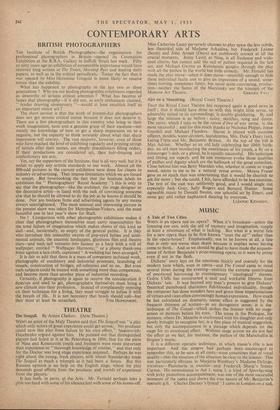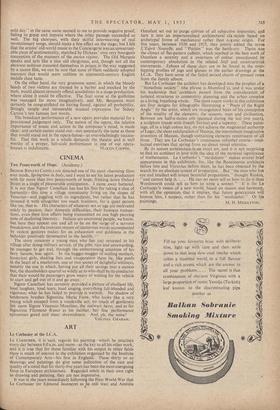MUSIC
A Tale of Two Cities WHEN is an opera not an opera? When it's broadcast—unless the listening eye can, with the aid of memory and imagination, supply at least a minimum of what is lacking. But what is a worse fate for a new opera than to be first known "over the air" rather than in the opera-house ? Emphatically, not to be known at all, a fate that is only not worse than death because it implies never having come to birth. And so we should be glad to have made the acquain- tance of Arthur Benjamin's prize-winning opera, as it were by proxy even if not in the flesh.
Dickens' story lays on the emotions thickly and coarsely for the modern taste which, even in opera—and The Consul came to mind several times during the evening—restricts the extreme contrivance of emotional harrowing to contemporary "ideological" themes. Cedric Cliffe has constructed a neat and workable libretto from Dickens' tale. It was beyond any man's powers to give Dickens' theatrical pasteboard characters full-blooded individuality, though the composer has done wonders here and given these impersonations of virtues and vices often convincingly human expression. How much he has calculated on dramatic, scenic effect is suggested by the frequent thinness of texture—in no derogatory sense; it is the technique of The Consul—which strikes the listener with no stage- action or pictures before his eyes. The scene in the Prologue,, for instance, where Dr. Manette is confronted with his daughter and only slowly brought to recognise her, is a fine piece of musical suggestion, but only the accompaniment to a passage which depends on the stage for its emotional effect. Without stage action we do not feel the effect as we feel, for instance, the pathos of the Marschallin in Strauss's music. It is a different operatic technique, in which music's role is less important. And the singers had perhaps been encouraged to remember this, to be sure at all costs—even sometimes that of vocal quality—that the emotion of the situation be clear to the listener. This was particularly obvious in Marjorie Westbury's Madame Defarge, tricateuse—Pasionaria in excelsis—and Frederick Sharp's Sidney Carton. His monodrama in Act 1, scene 1, a kind of Spreehgesang with jerky pianoforte accompaniment, was one of the most,successful moments of the opera and shows the true nature of Mr. Benjamin's operatic g;ft. Charles Darnay's lyrical ".I came to London on a sad, cold day" in the same scene seemed to me to provide negative proof, failing to grasp and impress where the other passage succeeded so well. The big choruses, with their skilful interweaving of real revolutionary songs, should make a fine effect on the stage; but I felt that the aristos' old-world music in the Conciergerie was an unwarrant- able piece of sentimentality, matched by Dickens' own very bourgeois conception of the manners of the ancien regime. The Old Marquis speaks and acts like a nice old clergyman, and, though not all the ancienne noblesse consoled themselves in prison in the way suggested by a recent film, we can be sure that none of them suddenly adopted manners that would seem sublime to nineteenth-century English middle class taste.
On the other hand, the very gruesome scene, in which the bloody heads of two victims are dressed by a barber and mocked by the mob, would almost-certainly offend sensibilities in a stage-production, where alone it could be effective. The final scene at the guillotine was managed far more imaginatively, and Mr. Benjamin must certainly be congratulated on having found, against all probability, fittingly simple and memorable musical expression for Sidney Carton's too famous last words.
The broadcast performance of a new opera provides material for a provisional judgement only. The nature of the opera, the relative importance of music and action in the composer's mind, is made clear; and certain scenes stand out—not necessarily the same as those that would stand out in the opera-house—as overwhelmingly success- ful. That this work as a whole demands the theatre and is well worthy of a proper, full-scale performance in one of our opera-



































 Previous page
Previous page